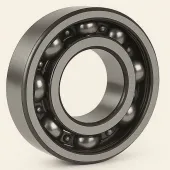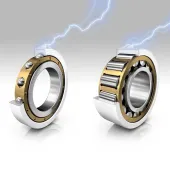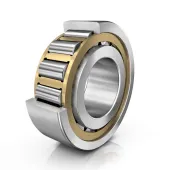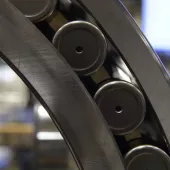Cost benefits of split roller bearings over standard bearing types
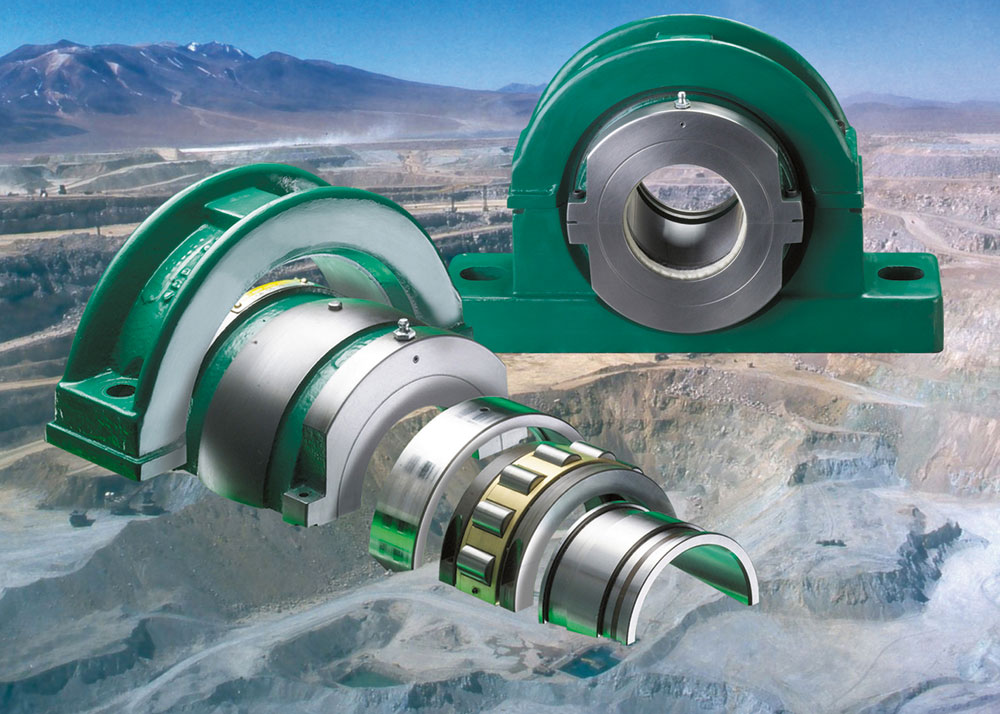
First published in the October 2013 issue of Quarry Management as Splitting the Difference
Standard bearing types are costing the extraction industries dearly. Adrian Menzies, sales and marketing director with Revolvo Ltd, explains why the lowest-cost bearing solution for the OEM is usually the most expensive for the quarry end-user.
It can take as little as 30 min to replace a split roller bearing and even less time to inspect it; whereas solid bearings routinely take many hours and sometimes days to replace, and are notoriously difficult to inspect while in place. Yet, overwhelmingly, solid bearings comprise the major segment of rolling bearings in use in the extraction industries today.
Solid roller bearings are difficult to fit and to replace, and usually impossible to visually inspect while in service, relying instead on complex and expensive vibration-monitoring systems for critical units. But, with the smaller sizes in particular, they are relatively inexpensive to purchase so few companies compare the overall lifetime costs with those of alternatives, such as split roller bearings (SRBs). In an industry that is driven by cost-down pressures, rectifying this situation could potentially lead to large savings in maintenance and plant downtime.
Companies are increasingly embracing the fact that to achieve performance gains, they must first achieve improved production efficiencies. To achieve these longer-term efficiencies it may be more cost-effective to specify components that initially cost a little more, but will reduce maintenance and repair costs during their service life, therefore offering the customer a lower ‘whole-life cost’ and reducing the total cost of ownership (TCO). It is the classic situation where the component with the lowest initial price often does not offer the customer the lowest lifetime cost.
This is particularly true of bearings and is one of the major reasons why companies in all industries are increasingly turning to Revolvo’s SRB split roller bearings as a means of reducing downtime. So why bear the additional initial purchase cost? The answer is threefold: initial installation time can be reduced by up to 90%; bearings can be inspected in situ; and split roller bearings and housings can be replaced speedily and with ease if there is a maintenance issue.
Unlike solid bearings, SRB split roller bearings are totally split to the shaft; a design that both simplifies and expedites installation and reduces downtime when compared with replacing solid bearings of the same size. Split bearings allow the shaft to be supported by the lower section of the bearing while the top section is removed, making bearing inspection simple without the need to remove drives or the shaft itself. This intrinsic feature is especially valuable with regard to large machines, where sheer weight and size can be a barrier to fast and effective servicing.
The relative price differential which can be significant for smaller bearing sizes starts to narrow for larger bearings, with sizes above 220mm shaft diameter being more comparable in price, and very large bespoke sizes in excess of 400mm shaft diameter often similar in cost, especially when availability also starts to become an issue. With large split bearings available on relatively short lead times, they fare well in comparison with some large, made-to-order sizes of solid bearings from the global manufacturers, which are far more susceptible to changing market conditions and sometimes have quoted lead times that vary from months to years.
The additional cost of purchasing a split bearing comparable in size to a solid bearing is often no more than the additional maintenance cost for one replacement
unit, and a fraction of the cost of any unplanned downtime. Should a solid bearing fail on a crucial piece of quarry equipment it may take days to replace, requiring not only the bearing replacement, but the dismantling of the machine and specialist tools, and sometimes lifting equipment, to remove it, which also creates the possibility for more damage to be caused during the machine disassembly and shaft-handling process.
With SRB split bearings the spherical location between the housing and the support pedestal ensures that under conditions of shaft misalignment, and irrespective of the type of seal used, the seal always remains concentric to the shaft. As a result, SRB split roller bearings perform particularly well in harsh operating conditions (in some cases underwater) even with serious shaft misalignment, whereas solid mounted roller bearings can suffer from non-concentric ineffective seals that will rapidly lead to expensive premature bearing failure.
Revolvo have taken this advantage forward and developed high-performance labyrinth and Kevlar packing seals, which provide effective sealing even in the worst operating environments. This has been evidenced in many applications, including numerous cement plants worldwide where Revolvo labyrinth seals have overcome a long-term problem of premature failures of hanger bearings on cement screw conveyors.
From the technical, economic and pure design perspectives, SRB split roller bearings offer a host of advantages and cut downtime significantly for the end-user. The simplicity of fitting a split roller bearing and its design, compared with a solid bearing, are major factors in its longevity.
It is understandable why, during the specification stages of a new project, an OEM may choose to make short-term savings by specifying the most inexpensive bearing for the job. It is important, however, that the end-user considers whole-life costs, specifically downtime implications for maintenance and repairs. Talking to split roller bearing specialists, such as Revolvo, will help provide an understanding of the long-term savings that are possible in most applications, and ensure that OE manufacturers fit bearings that will not cost dearly in the long run.
For further information visit: www.revolvo.com
- Subscribe to Quarry Management, the monthly journal for the mineral products industry, to read articles before they appear on Agg-Net



